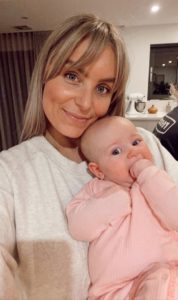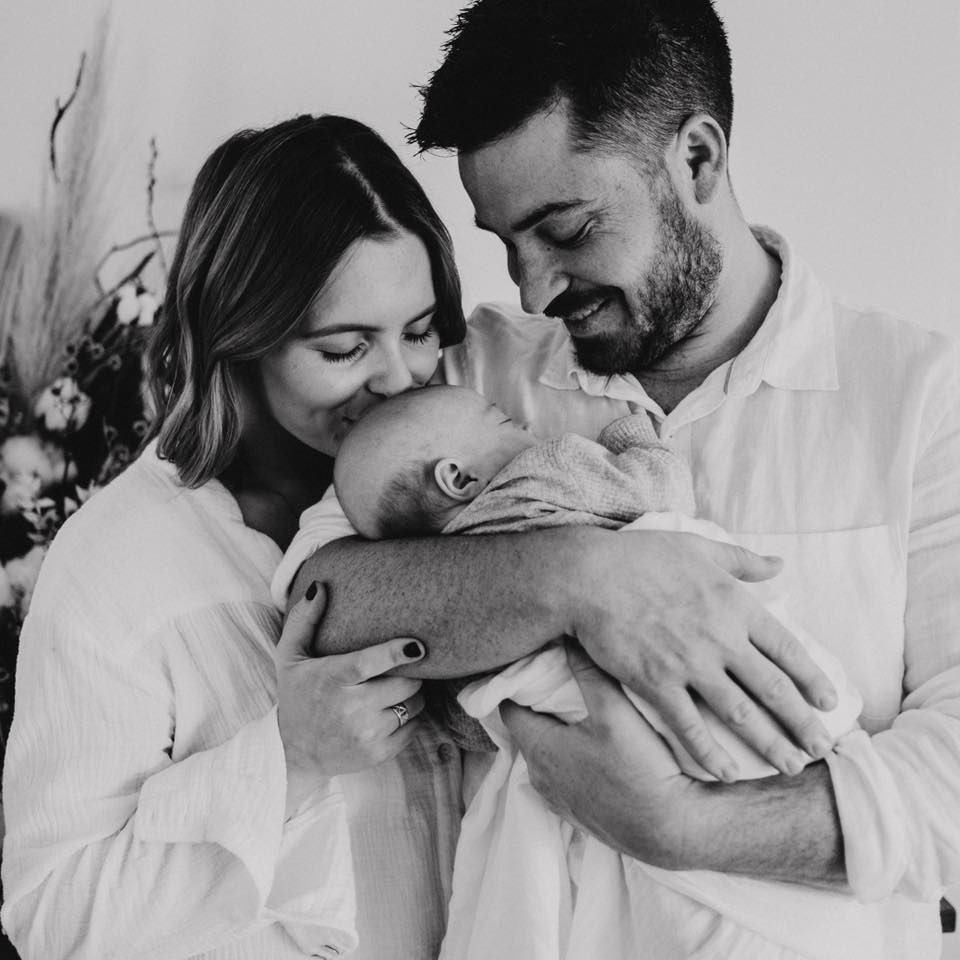Precautions taken by medical staff left new mum, Jess Bowen, feeling traumatised, “diseased” and excluded during her first birthing experience.
“I felt like I was diseased. The doctor would whisper to the nurse that I should have my mask on like I had the Corona Virus. It felt awful.”

Melbourne mum and hairdresser, Jess Bowen, gave birth to her first baby on the 28th of March this year, when the pandemic was beginning.
“My pregnancy was wonderful. I didn’t have any complications and I was excited to give birth,” shares Jess.
At Jess’s final appointment with her midwife, protein was found in the urine indicating pre-eclampsia, whereupon she was admitted into the hospital and immediately induced.
Jess laughs about not having enough time to gather her things, pack a bag or worst of all, “put on fake tan”.
Being a new mum is stressful without the added pressures of a global crisis. Jess describes her experience at the hospital as “traumatic”. She says the nurses were cold and “on edge with Covid happening. This made them short and abrupt.”
Once admitted, Jess was induced using a Foley Bulb induction, commonly known as the “Balloon Method”, where a Foley catheter is inserted into the cervix and is inflated, with sterilised water or air, over a period of time to help the cervix dilate for birth.
The nurses monitored her during the process by checking her dilation using their fingers. “It felt awful,” Jess recalls. “There’d be no warning. Just enter the room, stick their fingers in and would be disappointed because I wasn’t dilating fast enough. They weren’t reassuring me so it would just make me feel anxious.”

Eventually, the doctor arrived to examine her.
“He was really quite abrupt and rude. He basically told me that I had a disease (referencing her pre-eclampsia). I’m a new mum and it’s not really something that I want to hear. He just said I have a disease and we have to get this baby out.”
Jess says at one point she coughed to clear her throat, and the doctor immediately pulled the nurse aside and whispered, “she should have a mask on”.
“It was horrible to hear that. I felt so excluded and was already feeling disgusting from when the doctor called me diseased earlier.”
Jess can’t help but think how her experience may have differed if she wasn’t giving birth during these unprecedented times.
Jess rarely saw the doctor after this. Any interactions from the medical staff were limited until she was ready to deliver. After a day of the Balloon, she had only dilated one centimetre and needed to try another method.

Jess speaks highly of her head midwife, Jenny, throughout this process saying, “She was out of this world amazing, overall an experience from having that doctor, she made it so much better.”
She was then induced through the use of Oxytocin, which is a synthetic hormone that is administered through a drip in the arm to start the contractions.
Jess describes these contractions to be the most painful thing she’s ever experienced before.
“Immediately I felt anxious. I felt really depressed. They basically said to me that I needed to try, because at this point, I was feeling deflated and wanted to have a C-section.”
A few hours after starting the Oxytocin, Jess felt a sharp pain to the right of her stomach and had the urge to go to the toilet. The head midwife checked her and told her that she was three centimetres dilated. Jess immediately asked for an epidural, which was a 15-minute wait. During that time, Jess says she dilated 10 centimetres and was ready to deliver.
Jess went into shock and was crying through “the worst pain of her life”.
“Throughout the pushing process, I didn’t opt for any gas or pain relief because I was in such shock. It was a traumatic experience for me with everything that was going on and the treatment of the staff with Covid-19. It was frightening.”
Jess finally gave birth to her beautiful girl, Isla. Fortunately, she had her partner with her through this process.

“No one else was allowed to visit me in the hospital and my partner was only allowed during a small time-frame in the day, so during the inducing process and after giving birth, I didn’t have support from my family to get me through this. I just wanted my mum there.”
Hours after Jess gave birth, the nurses continued to monitor her bleeding through a weighing process to ensure there weren’t any further complications. Jess explains being “on a high with adrenaline” throughout this and wasn’t paying attention to the rising concern from the nurses as she surpassed a litre of blood.
After 20 minutes from her last check-up, Jess had sat up and explained the sensation of her “water breaking”. Jess lost 1.8 litres of blood and the head midwife called the surgeon. She recalled nurses accidentally dropping blood on the ground and described her room to be a “murder scene”.
During emergency surgery, Jess says they put a plastic box over her head. “It made me feel really small. The surgeon felt bad about it and was trying to reassure me that it was just protocol with Covid-19.”
After this, Jess was relatively okay. She had spent the last remaining hours after surgery with her partner and her new baby girl, but at 5 AM, her partner was told to leave.
“My partner was annoyed but I was still running on adrenaline, so I was less upset. I was happy and messaging my family about the good news and it was just one of those situations where ‘it is what it is’.”

When Jess was finally able to go home, Victoria’s first round of lockdown’s was in full effect and she spent her first weeks as a mother trapped in her home alone with her partner. Jess was suffering from the baby blues and wasn’t able to lean on her family for help.
“It felt like everything I was doing was wrong. I was barely sleeping, could barely walk because of the blood loss. I just didn’t know what to do. There wasn’t a single day during the six-week lockdown where I didn’t cry.”
Jess speaks about the importance of seeking help. The moment lockdown ended, she went to her psychiatrist and was put on anti-depressant medication.
“No one ever warns you about the way you feel after you give birth. I felt like it was unusual to be experiencing this level of sadness and anxiety when I have the most perfectly healthy baby girl who was gaining weight. Everyone else seemed so happy after their birth that it was hard not to compare myself to them.”
Isla is now five months old and Jess is feeling tremendously better. The lockdown had lifted so that gave her time to introduce her new baby to her family and friends.
“The medication is really helping. I’m starting to feel like myself again and my partner is seeing the improvements too.”
Even though Melbourne has gone back into lockdown again, she’s sad that her family don’t get to see Isla during some significant milestones, she feels much more prepared and stable to tackle what comes next.



